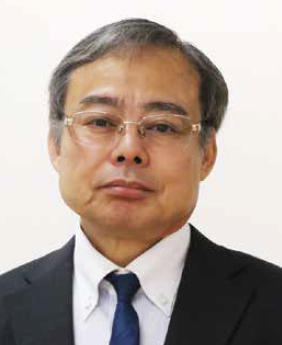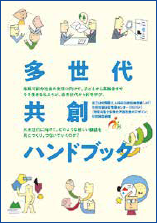Today, as Japan approaches maturity as a society, it faces complex issues such as depopulation, an aging society with a declining birth rate, fiscal deficit, and climate change. As such, various aspects of “sustainability,” including environmental, social and economic sustainability, are becoming major issues. In addition to the consideration of society as a whole, the improvement of quality of life and the realization of richness in mind of each individual, from the young to the elderly, need to be addressed.
With the aim of realizing a sustainable society, this Focus Area promoted R&D for co-designing cities and rural communities, where people of various generations and backgrounds played active roles while taking future generations into account (Completed in March 2020).
Program Supervisor

OMORI Takashi
Former Chair of Economic Committee, Asia-Pacific Economic Cooperationand Former Professor of Osaka University
(as of the completion of the R&D Focus Area)
Despite dramatic advancements in science and technology, today's society faces many issues including declining birth rate, aging of population, growing fiscal deficit, increase in environmental burden, depopulation in rural areas, and increased risk of natural disasters. These issues are all related to sustainability and common throughout the globe, with some differences per country, as indicated by the adoption of the SDGs (Sustainable Development Goals) at the United Nations Sustainable Development Summit in 2015.
While various efforts have been made to tackle these issues, it is clear that a segmented approach treating them separately has limited impact. Instead, we should take a holistic approach towards the real problems in respective regions, taking into account the varied local resources available.
We believe that intergenerational co-creation is an important methodology in this regard. This is because an intergenerational approach makes people active, affects their mindset, enables gathering of diverse knowledge, facilitates consensus formation, and enhances sustainability of activities.
This is not to say all problems can be solved by this methodology, or that there is no room for improvement. Hence, we would like to further develop methods of intergenerational co-creation as a social technology, so that people in many regions can take advantage of it. This will, we believe, help lead to the realization of sustainable society.
Goals
Our aim can be summarized in the following three points:
(1)We will clarify how intergenerational co-creation is effective in achieving sustainability in cities and regions.
(2)In the areas where intergenerational co-creation is expected to be effective, we propose mechanisms to promote, put into practice and improve it.
(3)We will make efforts to implement these mechanisms in our society while building a network for exchanging experiences and know-how.
Almost all the projects in this research area have regional fields, owing to the above point of view, providing a venue for first verifying their research hypotheses. In addition, each aims for activities to continue in some way so that they become ingrained into society beyond the RISTEX research period.
By "co-creation," we mean a cooperative activity to create something together, rather than simply allowing one generation to take care of the other. What we expect to be created are not necessarily physical products, but could well include values such as improvement in health or well-being, and reduction in fiscal deficit or environmental burden.
Message from the Area Director
It has been a while since people recognized the importance of "sustainable society." Since then, there have been advances in various science and technology, accumulation of capitals, and establishment and maintenance of systems. However, unfortunately we cannot say that the sustainability of our society was enhanced. There are many global environment issues which continue to deteriorate. Cumulative deficit in Japan is growing rapidly, close to exceeding the economic growth rate. There is a concern of the future of many local governments due to depopulation. The gap between the rich and the poor has been widening in many advanced countries.
It is known that after a certain level of income is attained, the level of happiness and life satisfaction do not improve substantially with income increase. Although Japan seems to have entered that stage, we cannot ignore that the level of life anxiety in Japanese people shows an increasing trend. More often than before people say that "the world is becoming degenerated" or "it is becoming more difficult to live." These vague senses of anxiety seem to be deeply related to the issue of sustainability.
There are various approaches to build a sustainable society. I would like to pay respect to many people who are making efforts on respective themes in their own ways. In this area, we focus on an attempt to build a sustainable society with the method of "intergenerational co-creation." Sustainability does not mean to keep on repeating the same thing; it is necessary to closely examine what should be changed and what should be maintained. In the world with uncertainty, consensus needs to be formed in the society, including a viewpoint of what should be passed onto the future generation.
In old days, production and living space used to be integrated, and people from different generations cooperated at home and communities in various ways. In such society, people realized they are in charge of a slice of eternal history called "now". Such opportunities decreased with the advent of mass production, nuclear family, urbanization, and globalization; meanwhile, recent progress in information and communication technology enabled people to bond and help with one another in new ways.
We will keep on to strive toward building a new way of lifewhich can make people feel secure that the prosperity of humankind will continue and also toward necessary science and technology for society to realize it
Summary of Outputs of the R&D Focus Area
The goals of this Focus Area were: (1) to clarify how intergenerational co-creation is effective in achieving sustainability in cities and regions, (2) to propose mechanisms to promote, put into practice and improve intergenerational co-creation in the areas where it is expected to be effective, and (3) to make efforts to implement these mechanisms in our society while building a network for exchanging experiences and know-how.
Intergenerational co-creation is important in the following three aspects. Firstly, from a chronological perspective, it helps to firmly establish the philosophy and policy of passing on or bridging resources (stock) inherited from the past to the future by appropriate governance. Secondly, from a perspective of local communities, cross-sectoral and comprehensive approaches are required in dealing with many of the problems related to sustainability, while communities are becoming less functional and more people opt for homogeneous connections with those of the same generation. Thirdly, it is important in generating a new notion of “wealth,” which is related to the vision of social progress we should seek in place of economic growth, that is approaching saturation.
Intergenerational approaches were found to have the following
advantages.
(1) It encourages the elderly to be active and young to be motivated.
(2) It provides a base for mutual aid in local communities.
(3) It promotes renewal and inheritance of local traditional arts, crafts and industries.
(4) It reminds people of the course of history, leading them to think of local history and nature, as well as future generations.
(5) It addresses problems caused by segmented society. Youths not yet part of a group, elderly who have already left their group
(6) It lowers psychological barrier to participation and promotes sustainability.
“Could you help us make our activities more inclusive of all ages?”
(7) It Introduces the “healing power” of children.
More effective than animal or robot therapy?
Dissemination of Outputs of the Focus Area / Projects
Research questions for the Focus Area created had been discussed regularly in general meetings for all projects and the management group (on-site lodging) and other opportunities, while individual projects were asked to respond to these questions in their reports, and to update their answers based on the knowledge that accumulates as the projects progressed. These were compiled into cross-sectorial outputs of this Focus Area.
< Research Questions for the Focus Area >
- What is the significance / effectiveness of intergenerational co-creation?
- What are the incentives for intergenerational co-creation?
(particularly for the young) - What are the impacts and implications of new technologies?
- What is required for intergenerational co-creation to diffuse and be adopted?
- What are the indicators for evaluating intergenerational co-creation?
- What is the significance of the local natural environment in intergenerational co-creation?
 In addition, for the people who want to engage in intergenerational co-creation in the future, a handbook was produced which summarized the experiences of various projects and provided simple explanations, with actual examples, of what to keep in mind when implementing an intergenerational co-creation approach.
In addition, for the people who want to engage in intergenerational co-creation in the future, a handbook was produced which summarized the experiences of various projects and provided simple explanations, with actual examples, of what to keep in mind when implementing an intergenerational co-creation approach.
Furthermore, a collection of keywords (e.g.,“co-creation melting point,” “parkification,” etc.) was produced which helped to identify the core concepts and issues regarding intergenerational co-creation.
* These outputs are shown on the Focus Area’s website.
R&D Projects
FY2016
|
Restoring a Beautiful and Rich Inner Bay through "fish Local, Eat Local" |
2016.10-2020.3 |
|---|---|
|
Restructuring Local Livelihoods and Fostering Diverse Lifescape through Cooperative Ateliers in Rural Communities |
2016.10-2019.9 |
|
Revitalizing Streetscapes by Utilization of Vacant Houses and Neighborhood Medical Care |
2016.10-2020.3 |
|
Building a Support System to Public Facility Management for a Sustainable Region |
2016.10-2020.3 |
|
Development of an Intergenerationally Co-creative Community Model of Work-Life Integration |
2016.10-2020.3 |
|
Proposals on Intergenerationally Co-creative Models through Donation* |
2016.10-2017.9 |
|
Regional Revitalization Education by Intergenerational Philosophical Dialogue and Project Learning* |
2016.10-2017.9 |
|
An Investigation regarding the Mechanism of Intergenerational Inheritance of Social Capital* |
2016.10-2017.9 |
*Comprehensive and horizontal type: To obtain results as a whole area, study the effectiveness of intergenerational co-creation and systems to realize social implementation of research outcomes, with a broad perspective, instead of being limited to a specific geographical area.
FY2015
|
Practical Feedback for the Measurement of Various Aspects of Happiness in Local Areas and the Sustainability of Intergenerational Societies |
2015.10-2020.3 |
|---|---|
|
Creating an Intergenerational Platform for Utilizing Regional Resources through Sheep Farming |
2015.10-2018.9 |
|
Distributed Rainwater Management for a Sustainable Well-being Society |
2015.10-2020.3 |
|
Developing a Multi-layered and Intergenerational System of Cooperation in Community |
2015.10-2019.3 |
|
Creating a Fountain of Future Lifestyle Ideas |
2015.10-2019.3 |
FY2014
|
Ensuring Sustainability at Local Government Level through Promoting Implementation of Multigenerational Participatory Stock Management Methods |
2014.11-2020.3 |
|---|---|
|
Development of Mobility Assist System for the People with Visual Impairment by Collaborative Creation of Multiple Generations |
2014.11-2017.11 |
|
Evaluation of Effectiveness of Intergenerational Co-creative Community on ME-BYO |
2014.11-2018.3 |